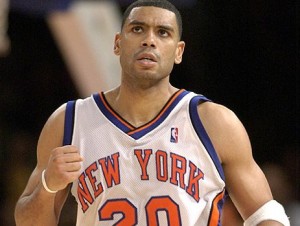One of the topics expected to be discussed during the NBA Lockout is the possible revival of The Allan Houston Rule. When a new CBA was agreed upon in 2005, it allowed NBA teams a one time opportunity to waive a player and not have his contract count against the luxury tax teams have to pay if their team salary exceeds a pre-determined amount set by the league. The released player becomes a free agent but his salary still gets paid and counts against his former team’s salary cap. Ironically enough, Allan Houston was not a victim of The Allan Houston Rule. The Knicks instead decided to waive Jerome Williams.
If the new CBA once again invokes this clause, most teams will probably take advantage since it would save them possibly tens of millions of dollars. To keep up with the times, we will change the name of this from “The Allan Houston Rule” to the “Rashard Arenas Rule” since Rashard Lewis and Gilbert Arenas easily have the two worst contracts in the league. Allow me to break down each team and who would end up being the casualties of this rule. Here is the Northwest Division.
Denver Nuggets:
The Nuggets would likely jump at the chance to erase last summer’s mistake of signing Al Harrington to the full mid-level exception. He is scheduled to make about $27.6 million over the next four years. That is an awful lot to pay someone who averaged 10.5 points and 4.5 rebounds per game last season and is clearly on the downside of his career. Denver is well under the cap though and getting rid of Harrington would leave them without a power forward. They could instead cut Kosta Koufos who is guaranteed $2.2 million this season in the final guaranteed year of his rookie contract.
Minnesota Timberwolves:
The 2005 Allan Houston Rule stated that a player acquired after June 21st could not be released. If that stipulation remained this time around, then newly acquired Brad Miller would be immune to this clause. Since the Timberwolves are not near the luxury tax, they likely pass on this one-time opportunity unless they look to cut Darko Milicic (three years, about $15.7 million remaining ) or Nikola Pekovic (two years, almost $9 million left.)
Oklahoma City Thunder:
The Thunder have created the blueprint on how to build a NBA franchise and not overspend on players. Still, they would probably consider cutting one of two players; Nate Robinson or B.J. Mullens. Robinson is in the final year of his contract that will net him $4.5 million but will likely be the fourth point guard on the depth chart behind Russell Westbrook, Eric Maynor, and 2011 first round pick, Reggie Jackson.
As for Mullens, he is only slated to make about $1.3 million in 2011-2012 and about $2.2 million in 2012-2013. However, he has also fallen to fourth on the center depth chart behind Kendrick Perkins, Nazr Mohammed, and Cole Aldrich. Plus, Mullens has not shown the development in his two seasons in the league that OKC would have hoped for.
Portland Trail Blazers:
You would have to assume Portland’s front office would think long and hard about dumping Brandon Roy who is guaranteed more than $49 million over the next three seasons but is a shadow of his former self due to chronic knee issues. It would be a difficult decision to make but it would save the Blazers a ton of money. If Roy’s health is deemed okay and he is not released, Portland likely passes on the rule since they do not have any terrible contracts.
Utah Jazz:
This one is easy as the Jazz would be foolish not to release Mehmet Okur who is entering the final year of his contract that will earn him almost $10.9 million in 2011-2012. There are serious questions about his health and the Jazz have solid depth up-front with Al Jefferson, Paul Millsap, Derrick Favors, and 2011 first round pick Enes Kanter.
MY OTHER ALL HOUSTON RULE BREAKDOWNS:
ATLANTIC DIVISION TEAMS
CENTRAL DIVISION TEAMS
PACIFIC DIVISION TEAMS
SOUTHEAST DIVISION TEAMS
David Kay is a senior feature NBA Draft, NBA, and college basketball writer for the Sports Bank. He also heads up the NBA and college basketball material at Walter Football.com and is a fomer contributor at The Washington Times Communities.
You can follow him on Twitter at DavidKay_TSB.
